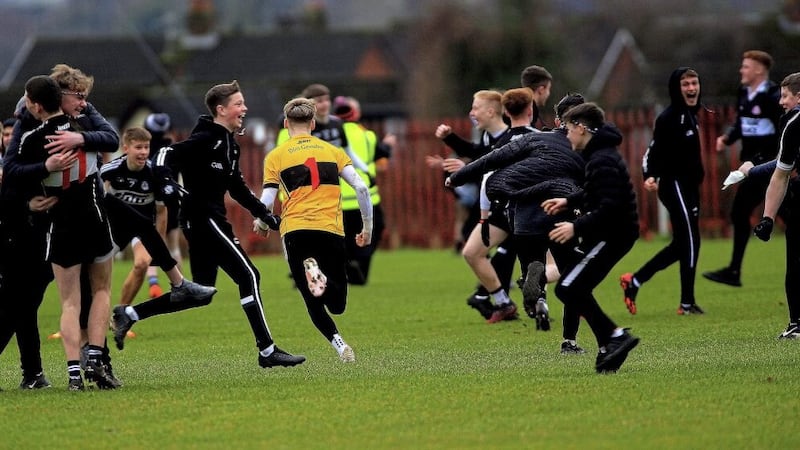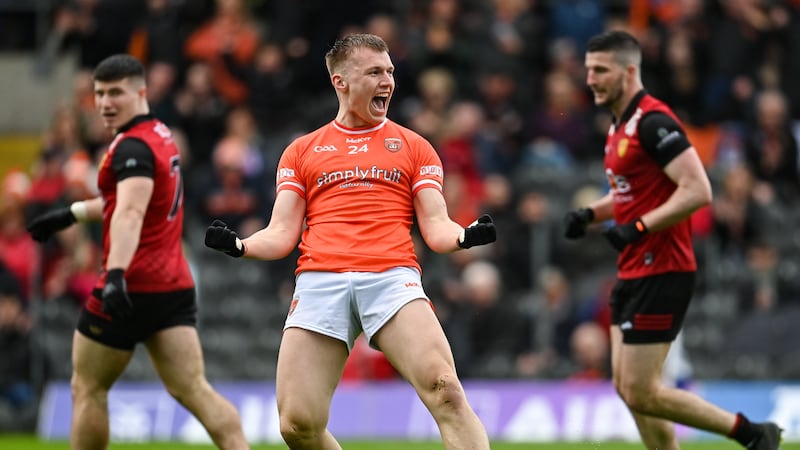THE plumes of the black flare still pouring over the heads of those in front of them, the Dungiven Ultras heave down the steps at St Paul’s towards the fence.
‘Use the top gate!’ implores one of the sixty-odd stewards on duty as the west Belfast club welcomed back its biggest day after three years. Nobody listens.
Colm McDonald added three minutes but injuries and black cards leave them wondering if the piece of string is so long it will snap before they reach the end.
Six minutes played, the final whistle goes. Half of them must have been up on the fence halfway over because by the time the players have realised, hundreds of supporters are streaming past them, looking for the one they want to embrace.
Everyone has a someone.
In the cold air that New Year’s Day always presents on the Shaws Road, mammies and daddies and grandas and brothers and uncles and grannies and coaches and friends all create their own beelines.
The minutes tick past. Five, ten, fifteen. The more of it disappears, the colder and darker the falling sky turns, you realise that maybe nobody actually cares about the trophy at all.
What is the trophy really? Just a prop to lift, to carry over the threshold of the changing rooms for that momentary explosion of joy that’s nearly the best bit of it all, to sit at the front of the bus and smile behind so that years from now, it won’t just be another random photo on your Facebook memories.
But we often make the trophy the destination only to realise when you actually get your hands on it that it was never really about that at all.
The trophy is only the burger after the night out. Sure, it wouldn’t be the same without it, but it’s not the thing you went there for and it’s not the bit you’ll remember years later.
Upscaling Sunday’s scenes of celebration, many of the same Dungiven people would have been on the pitch in Clones back in the summer when Derry ended their own 24-year wait for success.
There was real, genuine emotion woven through it all. That’s what winning does.
It’s not about some bent piece of silver with its scratches hidden by the annual lick of polish.
Chrissy McKaigue stood at the top of the steps and looked down on a sea of his own people. A combination of the warm summer sun and the nicest Derry jersey of a generation creates a feeling of uniformity.
But there’s nothing uniform about the emotion on the faces. Everyone has their own reasons to enjoy. You think of the players and their own clans, some of them with illness and strife and heartache to deal with that the general public knows nothing of.
Then there are the friends and the club team-mates and work colleagues.
It’s about that ownership of a team’s success.
Part of why sport works is that sense of owning just enough of a morsel of the joy when your team wins, whether it’s Dungiven or the LA Dodgers.
You can dance around your living room at Liverpool or Man Utd winning a Champions League but no part of it is yours, really, unless you’re one of the many Irish with genetic links. Even then, a lot of them are stretching it.
Compare that to the way the Argentinian public responded to their World Cup success. Five million people on the streets of Buenos Aires, willing to fall off a bridge just for a look. Five million!
Their wide-eyed passion is for their own, be it the national team or River Plate or Boca.
When their team wins, they win. It’s their victory too.
For the GAA, that not only works but it’s imperative to the whole thing.
Thirteen All-Ireland football finals and thirteen All-Ireland hurling finals have passed since the last spectator got on the pitch after a game in Croke Park. Since the Perspex fencing went up on Hill 16 and the netting began to get pulled across the seats to stop the invasion at source.
Health and safety is one thing, but the players are another. Some would tell you they’d prefer it the way it is now.
Jim McGuinness described Donegal’s 1992 success as “bedlam… a crush. Happy, but a crush.” The tranquility of twenty years later seemed to please him.
Niall McCoy’s recent book Kings for a Day revealed that Armagh players Aidan O’Rourke and Shane Smyth almost missed the presentation of Sam Maguire when they won it in 2002 because they couldn’t get through the crowd.
The Tyrone team that won the All-Ireland in 2021 were almost all of the age to go streaming on to the pitch during the noughties. For many of the players that won in the noughties, it’s a non-contest.
“Pitch invasion every day for me,” texted one.
“No way can anyone tell me just being the team is better,” said another.
When they had Croke Park to themselves after beating Mayo eighteen months ago, it was a conflicting feeling for some.
When a team wins an All-Ireland now, they do their victory lap untouched. Half the crowd has already gone for home by then, beating up to the road to meet the cavalcade back at home, where they feel more like they belong. Like they’re part of it. Like it’s theirs.
The team goes into the changing room, which is guarded like Alcatraz. Dipping out to the players’ lounge, whisked on to the bus, away for a meal.
They can be happily in their own company for nine, ten, eleven hours after the game. It’s time that’s owed to them but the absence of an invasion in between has a sterilising effect on the supporters. The elation of the final whistle has nowhere to escape and by the time a cavalcade arrives home at two in the morning, it’s just not the same feeling.
You can’t replicate it, you can’t fake it. There are no moments like those few moments right after the whistle goes. But that goes for the supporters as well as players. When it’s gone, it’s gone, and you can only get it back if you win again. Sometimes even then it doesn’t happen, because there’s no time like the first time.
By outlawing pitch invasions, you dim one of the most evocative moments in Irish sport and worse, you become a thief of joy from supporters.
It’s never just about a piece of tin.
Success belongs to fans the way the team itself belongs to them, as siblings and sons and parents and friends.
It isn’t, and shouldn’t be, the sole preserve of players.









